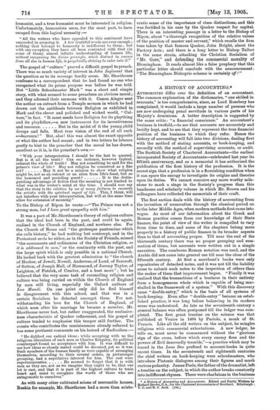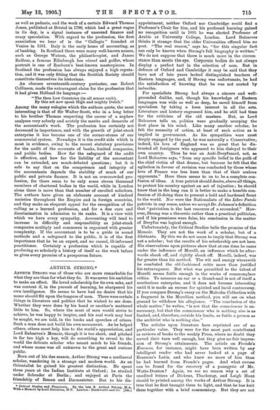AUTHORITIES differ over the definition of an accountant. The common
explanation of the dictionaries, "one skilled in accounts," is too comprehensive, since, as Lord Roeebery has complained, it would include a large number of persons who are now undergoing penal servitude in various parts of his Majesty's dominions. A better description is suggested by the same critic : "a financial conscience." An accountant's business is twofold,—to see that accounts are accurately and lucidly kept, and to see that they represent the true financial position of the business to which they refer. Hence the history of accounting will fall into two divisions, dealing first with the method of stating accounts, or book-keeping, and secondly with the method of supervising accounts, or audit. The Scottish Society of Chartered Accountants—the earliest incorporated Society of Accountants—celebrated last year its fiftieth anniversary, and as a memorial it has authorised the publication of the first history of the profession. It is the surest sign that a profession is in a flourishing condition when it can spare the energy to investigate its origins and theorise upon its duties. We cannot conceive any more worthy mile- stone to mark a stage in the Society's progress than this handsome and scholarly volume in which Mr. Brown and his colleagues have collected the memorials of their craft.
The first section deals with the history of accounting from the invention of numeration through the classical period on to the later Middle Ages, when modern methods first came into vogue. As most of our information about the Greek and Roman practice comes from our knowledge of their State finance, the point of view of the writer is compelled to vary from time to time, and some of the chapters belong more properly to a history of public finance in its broader aspects than to that of accounting proper. Till near the end of the thirteenth century there was no proper grouping and sum- mation of items, but accounts were written out in a simple narrative. The cumbrous Roman notation was used, and the Arabic did not come into general use till near the close of the fifteenth century. At first a merchant's books were only repositories of detached notes, and it was not till the liability arose to submit such notes to the inspection of others than the maker of them that improvement began. "Finally it was realised that the transactions of a business in their entirety form a homogeneous whole which is capable of being mar- shalled in the framework of a system." With this discovery came "double-entry," which is the basis of all systems of book-keeping. Even after " double-entry " became an estab- lished practice, it was long before balancing in its modern sense was understood. As late as the seventeenth century a general balance was often postponed till the ledger was com- pleted. The first great treatise on the science was that published at Venice in 1494 by Paciolo, a monk of St. Francis. Like all the old writers on the subject, he mingles religious with commercial exhortations. A new ledger, he tells us, must never be commenced without the "glorious sign of the cross, before which every enemy flees and the powers of Evil deservedly tremble,"—a practice which may be traced in the Lana Deo prefixed to account-books in quite recent times. In the seventeenth and eighteenth centuries the chief writers on book-keeping were schoolmasters, who introduce Platonic dialogues among their figures and much curious pedantry. James Peele, the father of the dramatist, left a treatise on the subject, in which the author breaks constantly into indifferent rhymes. There were charlatans in the business A History of Accounting and Accountants. Edited and Partly Written by Richard Brown, C.A., for the Chartered Accountants of Scotland. Edinburgh ; T. C. and E. C. Jack. [15e.] as well as pedants, and the work of a certain Edward Thomas Jones, published at Bristol in 1796, which had a great vogue in its day, is a signal instance -of unsound finance and crazy speculation. With regard to the profession, the first association we hear of is the " Collegio " founded at Venice in 1581. Italy is the early home of accounting, as of banking. In Scotland there were many well-known names, such as George Watson, the philanthropist, and James Balfour, a famous Edinburgh bon vivant and golfer, whose portrait is one of Raeburn's best-known masterpieces. In Scotland the profession has always enjoyed a high reputa- tion, and it was only fitting that the Scottish Society should constitute themselves its historians.
An obscure seventeenth-century poetaster, one Robert Collinson, made the extravagant claim for the profession that it had given Holland its language :—
" The then Low Countries (in all senses such), By this art now speak High and mighty Dutch." Among the many eulogies which the authors quote, the most interesting is that of Sir Walter Scott, who in a long letter to his brother Thomas respecting the career of a nephew analyses very soberly and acutely the merits and demerits of the accountant's work. The profession has certainly not decreased in importance, and with the growth of joint-stock enterprise it has become one of the corner-stones of our commercial system. Nowadays it is the credit side which is most in evidence, owing to the recent statutory provisions for the audit of the accounts of banks, limited companies, and public bodies. How far the safeguard of the audit is effective, and how far the liability of the accountant can be extended, are much-debated questions ; but it is safe to say that on the competence and integrity of the accountants depends the stability of much of our public and private finance. It is not an overcrowded pro- fession, for there seem to be only some eleven thousand members of chartered bodies in the world, while in London alone there is more than that number of enrolled solicitors. The authors have given an elaborate account of kindred societies throughout the Empire and in foreign countries, and they make an eloquent appeal for the recognition of the calling as a learned profession, and for a due care and discrimination in admission to its ranks. It is a view with which we have every sympathy. Accounting will tend to increase in difficulty and responsibility as joint-stock companies multiply and commerce is organised with greater complexity. If the accountant is to be a guide in sound methods and a safeguard to the public, it is of the first importance that he be an expert, and no casual, ill-informed practitioner. Certainly a profession which is capable of producing so scholarly a history of itself as the work before us gives every promise of a prosperous future.







































 Previous page
Previous page